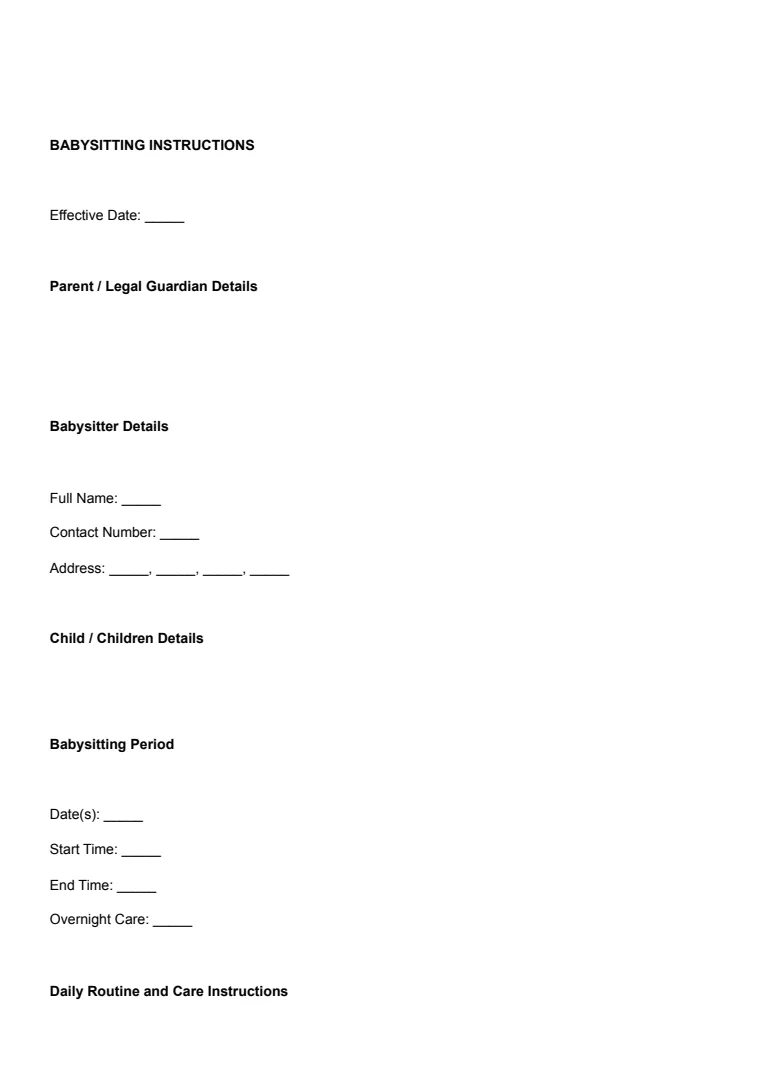What Is a Child Travel Consent Form?
A child travel consent form is a document that shows the accompanying adult or adults have permission to travel with the minor. It's particularly useful when a child is travelling without one or both parents, ensuring the journey is legally authorised.
It’s especially helpful as a consent letter for children travelling abroad, as having this form can ease potential hassles at borders.
It usually contains key details such as:
- Child's Information: Name, date of birth, passport number
- Travel Details: Destination, duration, travel dates
- Accompanying Adult's Information: Name, relationship, contact details
Imagine you're planning a family trip, and your child is heading out with just one parent or a grandparent. This form provides peace of mind as it confirms parental consent, reducing the chance of delays.
Whether you're arranging a minor travel consent form for international or domestic travel, having it prepared in advance is crucial.
Each country can have unique requirements, so check specifics before your journey. The form might even help when travelling with a minor on domestic flights.
Creating one isn't complicated. Permission to take a child abroad templates are readily available online and can be customised to fit your circumstances. Often, a simple letter of consent suffices for short trips.
Though not always legally required, a child travel consent form can prevent misunderstandings or issues with authorities. It's a straightforward measure that makes travelling smoother, assuring everyone that the journey is authorised.
When Is a Child Travel Consent Form Needed?
When planning a trip with a child, you might need a child travel consent form in several cases. These forms are especially important for international travel.
If your child is travelling overseas without one or both parents, countries often require proof of parental consent to prevent cases of child abduction.
You’ll need it if you're taking a child abroad without both parents or legal guardians. This requirement applies if you’re travelling with a minor relative or a friend’s child. Be sure to have their parent’s written permission prior to travelling.
If an adopted child is travelling, it's wise to check for additional documents like an adoption certificate. Authorities might request these alongside the travel consent to confirm legal guardianship.
Imagine your child is travelling alone or with only one parent. Airlines or border control officers might request a travel consent form to ensure that the travelling adult has the appropriate authority.
A clear travel itinerary is often crucial. Detailing the trip’s purpose, destinations, and duration in the consent form may help satisfy legal and safety checks.
Don’t forget to include passport information for both the child and the accompanying person, if any, in the form.
Providing a complete document will aid in smoother checks at airports or border controls.
How to Write a Child Travel Consent Form
To write a clear and appropriate travel consent form for a minor, you can easily follow these steps.
Step 1: Gather Important Information
Start by collecting all the necessary details. This includes the child’s full legal name, date of birth, and place of birth.
You'll also need the passport number for international travel.
Make sure to get the child’s travel plans, including dates, destinations, and flight numbers.
Step 2: Identify Individuals Giving Consent
List everyone who must provide consent. Typically, this includes all individuals with parental responsibility.
Get their full names, addresses, and contact information.
Ensure each person agrees to the travel plans and document the date when they consent.
Step 3: Detail Travel Itinerary
Write a short description of the travel itinerary. Mention the purpose of travel, destination, and departure and return dates.
Include any accommodations where the child will stay, providing addresses and contact details for these locations.
Step 4: Include Emergency Contact Information
Provide contact details of trusted persons who can be reached in case of emergencies. This should consist of their names, phone numbers, and possibly emails.
Make this section easy to find so that anyone can access it quickly if needed.
Step 5: Specify the Supervising Adult
Clearly indicate who will accompany the child on the trip. Identify this adult by their name, relation to the child, and contact details.
Specify their responsibilities during the trip to ensure the child’s safety and well-being.
Step 6: Sign and Notarise
Have everyone with parental responsibility sign the form. Consider having it notarised to increase its legal standing, particularly for international travel.
Check if a notary public or solicitor is needed, as requirements vary depending on the destination.
By following these steps, you'll create a clear and legally sound child travel consent form that helps ensure a smooth travel experience. You can also use an online permission to take a child abroad template for the UK to help you.














